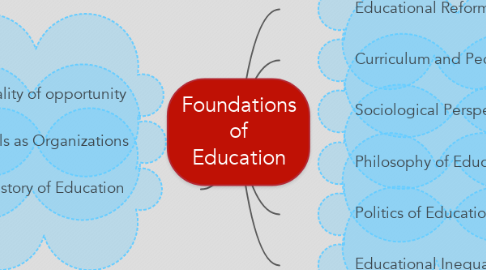
1. Equality of opportunity
1.1. The Coleman Study
1.1.1. 1982
1.1.2. Lower class students should be able to attend school with middle class and upper class.
1.1.3. Schools do make a difference
1.2. School Segregation
1.2.1. Evidence shows that highly segregated schools have lower achievement levels than integrated schools and minorities do better in integrated schools
1.3. Class, Race and Gender
2. History of Education
2.1. Old Deluder Laws
2.1.1. 1642
2.1.2. learn to read
2.2. Meritocracy
2.2.1. People who do well get rewarded
2.2.2. Thomas Jefferson
2.2.3. Education for everyone
2.3. Public Schools
2.3.1. boys only
2.4. Utilitarianism
2.4.1. technical schooling
2.5. civic motive
2.6. common school
2.7. Social-engineering Reform
3. Schools as Organizations
3.1. Great Britain
3.1.1. Margaret Thatcher tried to privatize public education
3.1.2. Education Reform Act 1988 created more centralized curriculum
3.2. France
3.2.1. Only the very elite have opportunity to move up educationally.
3.2.2. Schools for the poor and schools for the elite
3.3. Former Soviet Union
3.3.1. Centralized system- no one would be left in need
3.3.2. Communist Party children had benefits
3.3.3. Downfall of the Soviet Union was a result of the inequality that was created.
3.4. Japan
3.4.1. Centralized it's system in the 1880's
3.4.2. Education is highly competitive
3.4.3. Very demanding and rigorous college exams
3.5. Germany
3.5.1. Students are sorted at an early age
3.5.2. System is highly stratified and competitive
3.6. Finland
3.6.1. Highest scores on math, science, and literacy exams
3.6.2. Emphasis is on formative evaluations
3.6.3. Competitive salaries for teachers
4. Educational Reform
4.1. Theory of Educational Problems
4.1.1. Integrative Realm
4.1.1.1. basic skills and knowledge is the focus for school improvement and student achievement.
4.1.2. Developmental Realm
4.1.2.1. focus is on developing the whole child by having schools become more humane institutions.
4.2. Reform in Education
4.2.1. Two waves of attack
4.2.1.1. The first was concerned with accountability and achievement.
4.2.1.2. The second was concerned with the processes of the school.
5. Sociological Perspectives
5.1. Interactionalist
5.1.1. individual success depends on the idividual
5.2. Functionalist
5.2.1. everyone has a function
6. Philosophy of Education
6.1. Goal of Education
6.2. Key Researchers
6.3. Role of the Teacher
6.4. Method of Instruction
6.5. Curriculum
6.6. Generic Notations
7. Politics of Education
7.1. Conservative
7.1.1. Dependencies
7.1.2. Milestones
7.2. Schooling
7.2.1. Schedule
7.2.2. Budget
7.3. Progressivism
7.3.1. KPI's
7.4. Liberal
7.5. Education
8. Educational Inequalities
8.1. Functionalist Theorists
8.1.1. support the idea that each students’ success is determined by their own hard work and desire to succeed. support the idea that each students’ success is determined by their own hard work and desire to succeed.
8.2. Conflict Theorists
8.2.1. support the idea that student success is affected by their environment.
8.3. Interactionists Theorists
8.3.1. support that student success is determined by a combination of factors such as family, social class schools and environment.
9. Curriculum and Pedagogy
9.1. Historical Curriculum Theory
9.2. Sociological Curriculum Theory
9.3. Formal curriculum
9.3.1. Math, Science, Art, History
9.4. Null Curriculum
9.4.1. Taught but not obvious
9.5. Hidden or Informal Curriculum
9.5.1. Morally and Ethically right thing to do
9.6. Stratification of the Curriculum
9.6.1. students are tracked and directed
9.7. Effects of the Curriculum
9.7.1. schooling has an impact on learning
9.7.2. not all students will have the same educational experience
